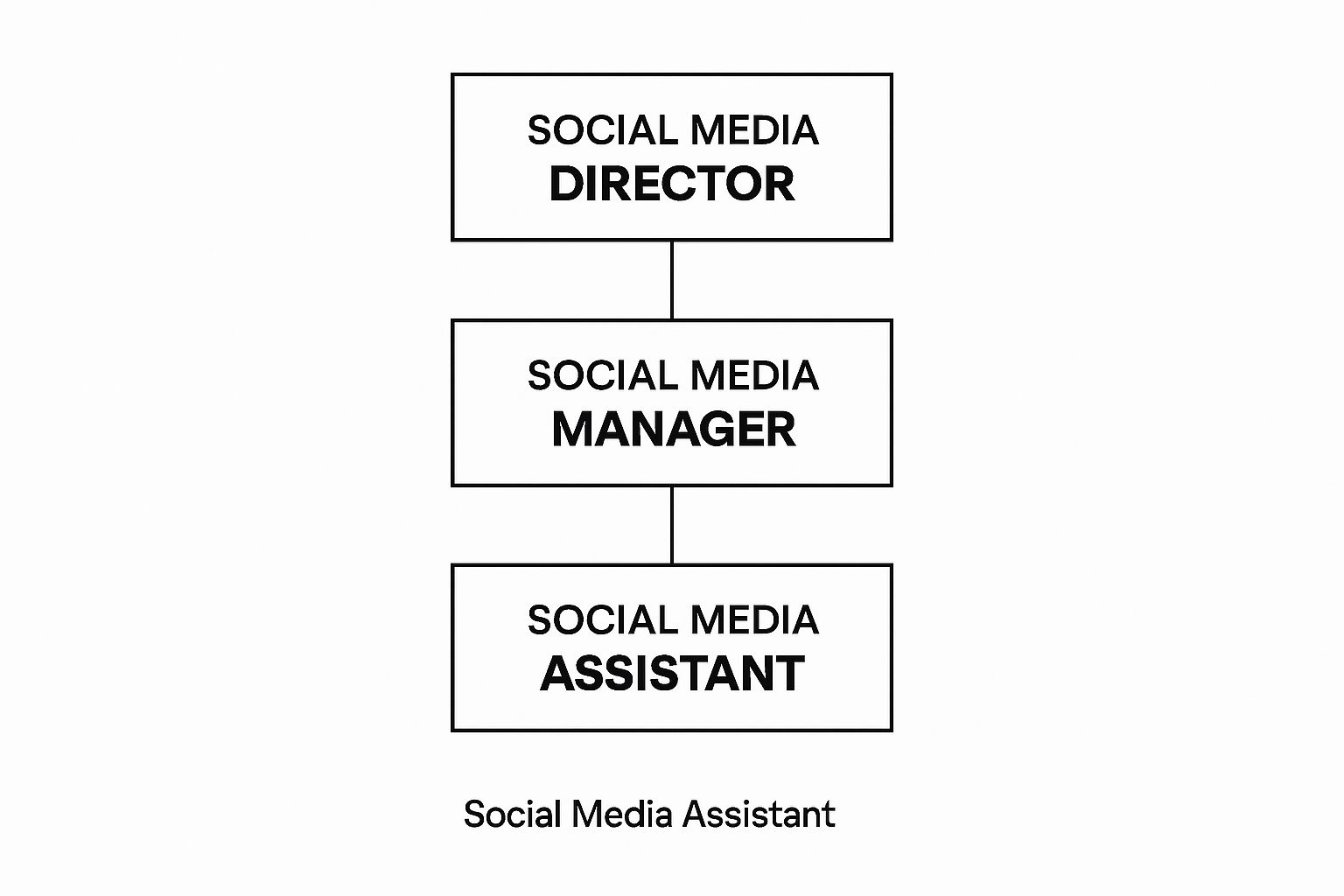
Your Guide to Careers in Social Media Marketing
Published
A career in social media marketing isn't just about posting cool pictures online. It’s a dynamic field that sits right at the intersection of creative thinking, sharp strategy, and hard data. These days, businesses of all sizes—from the corner coffee shop to global corporations—see social media as an essential way to grow, connect with customers, and drive sales. That makes it a career path with real security and plenty of room to grow.
Why Social Media Marketing Careers Are Booming
Think of a brand's social media presence as its digital town square. It’s where people hang out, discover new things, ask for recommendations, and decide who they want to do business with. Just like a physical store needs a smart layout and friendly staff, a brand’s online presence needs an expert hand to make it a place people actually want to be.
This simple reality has turned social media marketing into a non-negotiable part of modern business, creating a huge demand for people who know what they're doing. It’s not enough to just have a profile anymore; companies need people who can create content that stops the scroll, understand the ever-changing algorithms, and turn casual followers into paying customers.
A High-Demand, High-Stakes Field
The proof is in the numbers. Companies are putting serious money into their digital presence, and they're looking for talent to manage that investment. In fact, research from Robert Half's 2025 report highlights social media specialists as one of the most sought-after marketing roles.
The unemployment rate for these professionals is just 2.4%—significantly lower than the national average. This isn't a fluke; it's a clear signal that companies are competing for experts who can deliver real, measurable results.
At its heart, a career in social media is about building connections. You’re the bridge between a brand and its community, turning passive scrollers into genuine fans and advocates.
This demand creates a rich landscape of opportunities. Whether you're just starting out and love creating content or you're a seasoned pro ready to steer a brand's entire strategy, there's a role for you.
To give you a clearer picture, let's break down the most common jobs you'll find in the social media world. This table offers a quick look at what each role does and the kind of salary you can expect.
Social Media Marketing Roles at a Glance
| Job Role | Primary Function | Average Annual Salary (USD) |
|---|---|---|
| Social Media Coordinator | Creates and schedules daily content, engages with the community. | $45,000 - $60,000 |
| Social Media Manager | Develops content strategy, manages campaigns, analyzes performance. | $60,000 - $85,000 |
| Social Media Strategist | Designs long-term vision, oversees brand voice, analyzes market trends. | $70,000 - $100,000 |
| Community Manager | Builds and nurtures the online community, manages user engagement. | $55,000 - $75,000 |
| Social Media Analyst | Tracks data, measures campaign ROI, provides performance insights. | $65,000 - $90,000 |
As you can see, the path isn't a one-size-fits-all ladder. It's a branching tree of specializations, each offering a unique way to contribute to a brand's success and build a rewarding career.
Decoding the Core Social Media Job Roles

To really get a handle on careers in social media marketing, you need to look past the generic job titles. Think of it like a sports team: everyone wants to win the game, but each player has a specific position, a unique set of skills, and a different view of the field.
Let’s pull back the curtain and explore the "day in the life" of the most common roles. This will give you a much clearer picture of where your own talents and ambitions might fit into a modern marketing team.
The Social Media Coordinator: The Hands-On Creator
Ever wondered who’s actually behind the screen, bringing a brand’s voice to life every single day? That’s the Social Media Coordinator. This is often an entry-level or junior role, but it’s the absolute engine room of any social media team. Coordinators are the doers, focused on execution and daily engagement.
Here’s what their day-to-day looks like:
- Content Creation: They're the ones writing the post copy, creating simple graphics or quick videos, and making sure every piece of content feels true to the brand’s style.
- Scheduling and Publishing: They use tools like Hootsuite or Sprout Social to line up posts across different platforms, guaranteeing a consistent and timely presence.
- Community Engagement: This is a big one. They respond to comments, answer direct messages, and act as the first line of defense, flagging customer service issues for other teams to handle.
- Monitoring Trends: They keep a constant eye on what’s buzzing online, looking for chances for the brand to jump into relevant conversations authentically.
A great coordinator thrives in a fast-paced setting where they can be both creative and responsive. Their biggest challenge is usually juggling a dozen things at once—from putting out a small fire in the comments to quickly creating a post about a trending meme.
The Social Media Manager: The Strategic Leader
If the Coordinator is the engine, the Social Media Manager is the one in the driver's seat. This mid-level role is a mix of hands-on work and big-picture strategy. Managers are responsible for the "what" and "why" behind the content, not just the "how."
A manager’s focus is much broader. They're in charge of developing the content calendar, planning out campaigns, and making sure the team's work is actually helping the business meet its larger goals. They live in the analytics, figuring out what's working and what's not, and using those insights to steer the ship.
A key part of the Manager's role is translating big-picture business goals into actionable social media campaigns. They bridge the gap between high-level strategy and daily execution, ensuring every post has a purpose.
This role demands a blend of creative vision and sharp analytical thinking. A manager needs to lead a team, often manages a content budget, and has to report on performance to other departments or clients. They are the central hub of the entire social media operation.
The Social Media Strategist: The Big-Picture Thinker
The Social Media Strategist is the architect. This senior-level expert is less concerned with the daily posts and more focused on the long-term vision and where the brand fits in the competitive landscape. They’re asking the heavy-hitting questions: Who is our audience, really? How should our brand talk and act? Which platforms should we bet on for the next five years?
Strategists spend their time on deep market research, competitive analysis, and defining the brand's overarching voice and messaging pillars. They typically lead high-stakes projects, like launching the brand on a brand-new platform or developing a company-wide crisis communication plan. Their work lays the foundation that managers and coordinators build upon.
The Social Media Analyst: The Data Storyteller
While other roles lean into creativity and community, the Social Media Analyst lives and breathes data. Their entire job is to measure everything, make sense of the numbers, and tell the story of what it all means. They are masters of analytics tools, tracking key metrics like engagement rate, conversion rate, and, most importantly, return on investment (ROI).
An analyst provides the hard proof of what's working. They might build a dashboard showing how a recent campaign drove a surge in website traffic or present a report that proves Instagram Reels are generating more qualified leads than static image posts. Their insights are what justify budgets and make strategies smarter.
Of course, compensation reflects these different levels of responsibility. The financial outlook for careers in social media marketing varies quite a bit between roles. For instance, a social media strategist, who shapes the high-level vision, can earn an average of $63,883. A social media manager, who guides the daily operations, averages around $55,724 annually. You can explore more salary benchmarks on Coursera to see how experience and location can move those numbers.
The Essential Skills That Get You Hired

If you think a social media career is just about posting cool stuff on Instagram or TikTok, think again. The best professionals in this field are a unique hybrid: part artist, part scientist, and part business strategist. It’s a powerful combination that hiring managers are desperate to find.
Being able to write a tweet that gets people talking is one thing. Being able to look at the data and prove why it worked is what gets you hired and promoted. Let's break down the core skills you absolutely need to master.
The Creative Arts
This is the heart and soul of social media. It's what stops the endless scroll, sparks real conversations, and makes an audience actually care about a brand. Without that creative spark, even the most perfect, data-backed strategy will just be noise.
What does that look like in practice?
- Compelling Copywriting: This is about more than just good grammar. It's the craft of writing short, punchy text that grabs attention and makes people do something. You need to know how to be witty on X (formerly Twitter), inspiring on Instagram, and polished on LinkedIn—all while sounding like the brand you represent.
- A Sharp Visual Eye: No, you don't need a degree in graphic design. But you absolutely need a good sense of what looks good. This means understanding basic design principles so you can create (or direct) eye-catching graphics, videos, and Reels that feel on-brand and professional.
- Engaging Storytelling: People connect with stories, not sales pitches. A great social media pro knows how to spin a narrative across different posts and platforms, turning a boring product launch into an event people are genuinely excited about.
Think of these skills as your first impression. They’re the hook, and they're often the most visible part of your work.
The Analytical Science
While creativity gets the clicks, analytics tell you where to point your efforts. This is the "science" half of the job, where you use cold, hard data to make smart decisions, fine-tune your campaigns, and prove your worth. This is how you move from just "posting things" to driving real business results.
Being analytical means you can confidently answer the one question every boss will ask: "How do we know this is working?" It elevates you from a content creator to a critical business driver.
To get there, you'll need to be fluent in a few key areas:
- Data Interpretation: You have to be comfortable digging into the analytics on each platform. It's not just about knowing what reach or engagement rate means; it's about seeing the story the numbers are telling you.
- Platform Tool Mastery: Getting good with native tools like Meta Business Suite and third-party platforms like Sprout Social or Hootsuite is non-negotiable. These are your dashboards for scheduling content, monitoring conversations, and pulling reports.
- Understanding AI's Role: Artificial intelligence is no longer a futuristic buzzword; it's a practical tool. Knowing how to use AI for brainstorming content ideas, generating images, or analyzing audience sentiment can make you exponentially more efficient.
When you can confidently demonstrate the ROI of social media marketing, you immediately stand out from the crowd.
The Business Acumen
Finally, the best social media marketers understand that social media doesn't operate in a bubble. It has to connect to the bigger picture. Business acumen is the ability to tie your daily tweets and campaigns directly to core company goals, whether that's boosting sales, generating leads, or protecting the brand's reputation.
This really comes down to:
- Project Management: You'll be juggling content calendars, campaign deadlines, influencer collaborations, and team feedback. Strong organizational skills are a must.
- Budget Management: You need to know how to manage an ad budget or a creator campaign spend to make sure you’re getting a positive return on that investment.
- Market Research: Great social media managers are always listening. They keep a close eye on industry trends, what competitors are doing, and how their audience is behaving.
Building a solid foundation across these three pillars is your ticket to a successful and long-lasting career in this field. If you're ready to show employers you've got the goods, our guide on crafting a powerful social media skills resume will help you highlight these exact abilities.
Charting Your Career Path in Social Media
Thinking about a career in social media? It’s not a straight, narrow road. It’s more like a sprawling city map with countless routes—some are expressways to leadership, while others are scenic detours that let you become a deep specialist in a niche you love. The best part is, you get to draw your own map.
The sheer scale of opportunity is staggering. Social media isn't just a pastime anymore; it's a fundamental part of how we live and shop. With an estimated 5.42 billion users scattered across the globe—that's nearly two-thirds of the world's population—brands have a direct line to more people than ever before. This has triggered a tidal wave of investment in social advertising, projected to top $276.7 billion in a single year. That kind of money creates a stable and constantly expanding job market for talented pros.
The Traditional Career Ladder
For many, the journey starts in the trenches and climbs toward strategic leadership. It’s a classic trajectory for a reason: it gives you a rock-solid foundation. You master the day-to-day execution before you start making the high-level decisions.
This infographic gives you a bird's-eye view of that progression, from your first job to a top leadership role.

As you can see, the work evolves from hands-on tasks to shaping the big-picture vision.
Here’s a closer look at what that journey often looks like:
- Entry-Level (Coordinator/Assistant): This is where you cut your teeth. Your days are filled with creating and scheduling posts, engaging with the community by replying to comments, and keeping an eye on brand mentions. You're the one making sure the machine runs smoothly every single day.
- Mid-Level (Manager/Specialist): Now you're in the driver's seat. You're not just executing; you're planning. You’ll develop content calendars, run campaigns from start to finish, dig into performance data, and often guide the work of coordinators. This is where you start tying social media efforts directly to real business goals.
- Senior-Level (Strategist/Director): At this point, you become the architect. Your focus shifts to long-term strategy. You define the brand’s voice across every platform, manage sizable budgets, build out your team, and steer the entire social media department toward a unified vision.
While this ladder is a tried-and-true way to build a career, it's far from your only option in the dynamic world of social media marketing careers.
Specialist vs. Generalist: Which Path Is for You?
As you gain experience, you'll hit a fork in the road. Do you go deep or do you go wide? There’s no wrong answer here; both the specialist and generalist paths offer incredible opportunities.
- The Specialist: A specialist becomes the undisputed expert in one specific area. Think of the person who knows everything there is to know about running B2B campaigns on LinkedIn, crafting viral TikTok video ads, or managing influencer programs for beauty brands. They are the go-to authority.
- The Generalist: A generalist, on the other hand, develops a broad understanding of the entire marketing ecosystem. They know how social media, SEO, email marketing, and paid search all fit together to create a cohesive customer experience.
So, which one should you be? It really boils down to what gets you excited. Do you geek out on mastering every little feature of a single platform? Or do you get a bigger thrill from making all the different marketing channels sing together in harmony?
Accelerating Your Growth Through Agency or Freelance Work
Working in-house for one company is great for getting to know a single industry inside and out. But if you want to put your career on the fast track, agency life or freelancing can be a game-changer.
When you're juggling multiple clients across different sectors, you have no choice but to learn fast and adapt on the fly. This kind of pressure-cooker environment helps you build an incredibly diverse portfolio and skill set in a short amount of time.
This broad exposure is also a fantastic way to figure out what you truly enjoy. You might discover a hidden talent for helping e-commerce brands or find out you're a natural at building B2B communities. Exploring a detailed social media marketing career path can offer more ideas on how these experiences shape your future. Once you have a role in mind, you can start learning the specifics, like how to become a Community Manager.
How to Land Your First Social media Job

Knowing the roles and skills is one thing, but proving you’ve got them is the real game. Breaking into social media marketing can feel like a classic catch-22: you need experience to land a job, but how do you get experience without a job? The secret is to stop thinking, "I don't have experience," and start thinking, "I'll create my own."
The great thing about this field is that you don't need a single paying client to build an impressive portfolio. Hiring managers are looking for more than just a list of past employers. They want to see that you can think strategically, whip up compelling content, and truly understand what it takes to build an online community.
Build a Portfolio That Speaks for Itself
When you're starting out, your portfolio is your single most important asset. It's your chance to show, not just tell, what you can do with your skills, creativity, and strategic mind. Don't wait around for someone to hire you—start building it now.
Here’s how you can create portfolio-worthy projects from scratch:
- Create Mock Campaigns: Choose a brand you genuinely love and build a sample social media campaign for them. Put together a content calendar, design some eye-catching visuals, write sharp copy, and—most importantly—explain the strategy behind every choice you made. This shows real initiative and your ability to apply your skills to an actual brand.
- Volunteer for a Nonprofit: So many local charities and small nonprofits are desperate for social media help but just don't have the budget. Offering your skills pro-bono is an incredible way to gain real-world experience, get measurable results for your portfolio, and earn a glowing recommendation.
- Treat Your Own Social Media as a Case Study: Start an online project around something you're passionate about. It could be a blog, a movie review TikTok channel, or an Instagram account for your photography. Grow it with a clear strategy and document everything. Explain how you found your audience, which content worked best, and how you grew your followers and engagement. This turns a hobby into a professional case study.
Tailor Your Resume for a Human and a Robot
Here’s a hard truth: before a hiring manager even sees your resume, it’s probably going to be scanned by an Applicant Tracking System (ATS). This software filters applications for specific keywords from the job description. If your resume doesn’t have the right terms, it could be tossed out before a human ever lays eyes on it.
To get past the bots and then impress the people, you need a two-part strategy:
- Optimize for the ATS: Read the job description like you’re studying for a test. Pinpoint keywords like "content creation," "community management," "social media analytics," "campaign planning," or "brand voice," and make sure they appear naturally in your resume.
- Highlight Action and Results: Once a person is reading your resume, they want to see what you’ve actually accomplished. Use strong action verbs and back up your claims with numbers. Don't just say, "Managed a social media account." Instead, try: "Grew Instagram followers by 40% in six months through a targeted content strategy." See the difference?
Your resume gets you the interview. Your portfolio wins you the job. Both need to be polished, professional, and perfectly tailored to the specific role you want.
Prepare for an Interview That Shows Your Strategic Mind
The interview is where your resume and portfolio truly come to life. This is your moment to prove you're not just a post-scheduler, but a sharp strategic thinker. Be ready to go beyond simple answers and show the interviewer how you think.
To really stand out, have solid answers ready for these types of questions:
- "Show us a social media campaign you admire and tell us why." This tests your industry awareness and your ability to break down what makes a campaign successful.
- "How would you handle a sudden wave of negative comments on a post?" This is all about your crisis management skills. Can you stay calm, professional, and strategic under pressure?
- "If we gave you a $1,000 ad budget, how would you spend it?" This question reveals your understanding of paid social advertising and whether you can think about return on investment (ROI).
Breaking into this industry takes persistence and a proactive attitude. By building your own experience and presenting your skills in a compelling way, you can dramatically boost your chances. For a deeper look, check out our guide to finding great social media marketing entry-level jobs—it’s packed with more tips for getting your foot in the door.
Common Questions About Social Media Careers
Trying to start a career in social media marketing can sometimes feel like you've been dropped into a forest without a map. There are so many different paths, and it's easy to get turned around by myths or bad advice.
Let's cut through the noise. Here are straight, honest answers to the questions that come up time and time again. Getting these sorted out will give you the confidence to start moving in the right direction.
Do I Need a Specific Degree for This Field?
This is easily the most common question I hear, and the answer is a refreshing one: no, you don't need a specific degree. A background in marketing, communications, or even journalism can certainly give you a head start, but it's absolutely not a dealbreaker. What hiring managers really care about are skills they can see and results you can prove.
Think of your social media portfolio as an artist’s gallery showing. The gallery owner is far more interested in the quality and impact of the paintings than where the artist went to art school. It’s the same for a social media role—a manager wants to see that you can actually create compelling content, make sense of analytics, and think strategically.
The most important thing is your ability to prove you can do the job. A killer portfolio that shows off mock campaigns, work you did for a volunteer project, or even a personal account you grew successfully will always speak louder than a specific degree on a resume.
Your curiosity and willingness to adapt are your most valuable assets. The social media world moves at lightning speed, so a skill learned in a university class four years ago might already be obsolete. A genuine passion for learning is worth more than any credential.
How Important Is a Personal Brand?
In a field that’s all about building and managing online identities for businesses, your own personal brand is massively important. It’s not just a nice little extra; it’s a living, breathing part of your resume. It's you, proving you can do the work before you even walk in the door.
When a hiring manager looks you up online (and trust me, they will), a solid personal brand instantly tells them a few key things:
- You get the platforms: A well-kept LinkedIn profile and a professional, active presence on a platform like X or Instagram show you know the unwritten rules of each space.
- You can build an audience: Even a small but highly engaged following proves you know how to create content that connects with real people.
- You have a voice: It gives them a feel for your personality and communication style, showing you know how to craft a consistent identity—even when the brand is just you.
Building a personal brand isn't about becoming a mega-influencer. It's about showing up online as a knowledgeable, professional, and engaged person who reinforces the very skills you’re trying to get hired for. You get to practice what you preach.
What Are the Biggest Challenges Marketers Face Today?
While a social media career is incredibly dynamic and fun, it definitely comes with its own unique set of pressures. Knowing what they are ahead of time helps you prepare for the reality of the job.
One of the biggest hurdles is proving ROI (Return on Investment). It can be tough to draw a clean, straight line from a viral TikTok to a product sale. You'll need to get good at using analytics to weave a compelling story that shows how your social media work contributes to the company's bigger goals.
Another huge challenge is what I call algorithm fatigue. The platforms are always changing the rules on how content gets seen. A strategy that delivered amazing results last month might completely tank this month. To succeed, you have to be constantly testing, learning, and changing your approach without getting discouraged.
Finally, there’s the relentless demand for new content. The content machine never sleeps. This can easily lead to creative burnout if you're not careful. The best pros develop efficient systems for creating content, get clever about repurposing what they already have, and find ways to stay inspired.
Can I Get Into This Field Without Professional Experience?
Absolutely. This is where your portfolio transforms from a "nice-to-have" into your golden ticket. You might not have a formal job title to put on your resume yet, but you can still build a ton of legitimate experience.
The trick is to be proactive and create your own opportunities.
- Volunteer for a local nonprofit or small business. So many are desperate for social media help and would be grateful for a volunteer. This gives you real-world results to show and a fantastic testimonial for your portfolio.
- Launch a personal project. Start a blog, podcast, or niche Instagram account about something you're passionate about. Treat it like a real client: set clear goals, build a content strategy, track your growth, and document everything in a case study.
- Get certified. While a degree isn't vital, certifications from places like Google, HubSpot, or Meta show initiative and provide you with foundational knowledge that employers really do value.
Taking these steps shows that you have the drive, passion, and creativity to succeed. You aren't waiting around for someone to give you a chance; you're already in the game. That’s an incredibly powerful message to send to any hiring manager.
Ready to find your place in the fast-paced world of social media and influencer marketing? At Influencer Marketing Jobs, we connect talented professionals like you with top opportunities. Explore our curated job listings and find your next career move today!